- Home
- Tessa Gratton
Lady Hotspur
Lady Hotspur Read online
LADY HOTSPUR
Tessa Gratton
Copyright
HarperVoyager
An imprint of HarperCollinsPublishers Ltd
1 London Bridge Street
London SE1 9GF
www.harpercollins.co.uk
First published in Great Britain by HarperCollinsPublishers Ltd 2020
Copyright © Tessa Gratton 2020
Jacket photograph © Larry Rostant 2020
Jacket design © HarperCollinsPublishers Ltd 2020
Tessa Gratton asserts the moral right to be identified as the author of this work.
A catalogue copy of this book is available from the British Library.
This novel is entirely a work of fiction. The names, characters and incidents portrayed in it are the work of the author’s imagination. Any resemblance to actual persons, living or dead, events or localities is entirely coincidental.
All rights reserved under International and Pan-American Copyright Conventions. By payment of the required fees, you have been granted the non-exclusive, non-transferable right to access and read the text of this e-book on screen. No part of this text may be reproduced, transmitted, down-loaded, decompiled, reverse engineered, or stored in or introduced into any information storage and retrieval system, in any form or by any means, whether electronic or mechanical, now known or hereinafter invented, without the express written permission of HarperCollins.
Source ISBN: 9780008281922
Ebook Edition © January 2020 ISBN: 9780008281953
Version: 2019-12-05
Dedication
For My Mom.
You didn’t need to be a queen to make the world better.
Contents
Cover
Title Page
Copyright
Dedication
The Dragon
Prince Hal
Banna Mora
Hotspur
Prince Hal
Hotspur
Rowan
Here is how …
Banna Mora
Hotspur
Banna Mora
Prince Hal
Banna Mora
Three creatures watched …
Hotspur
Banna Mora
Prince Hal
Banna Mora
Hotspur
Banna Mora
The roses know …
Banna Mora
Hotspur
The Lion
Prince Hal
Hotspur
Banna Mora
Hotspur
Banna Mora
Prince Hal
Hotspur
Prince Hal
Connley
Eighty-seven years …
Charm
Connley
The ghost held …
Charm
Prince Hal
Be calm …
Prince Hal
Prince Hal
Hotspur
Prince Hal
The wizard slipped …
Banna Mora
Hotspur
Connley
Prince Hal
Hotspur
Connley
Banna Mora
Rowan
Prince Hal
The wizard had …
Hotspur
Connley
Prince Hal
The sky was …
Hotspur
Charm
Prince Hal
Banna Mora
The queen of …
Hotspur
Innis Lear likes …
Prince Hal
The Wolf
Innis Lear remembers …
An hour before …
Prince Hal
Hotspur
Prince Hal
Charm
Hotspur
Rowan
Connley
To Celedrix of …
Hotspur
Daughter— …
The drowsy trees …
Banna Mora
Prince Hal
The night before …
Banna Mora
Prince Hal
The day dawned …
Rowan
Prince Hal
Connley
There is light …
Banna Mora
Hotspur
Star-Seer
Every year the …
Acknowledgments
By Tessa Gratton
About the Publisher
The
DRAGON
PRINCE HAL
The March, late spring
HAL WAS NOT yet a prince when she fell in love with Lady Hotspur, but she would be within the hour.
It was the end of the battle, and Hal had been ordered to collect the knight of Perseria and bring her to the castle where their mothers waited.
Hal was exhausted, but lit up inside with awe and hope and rippling terror. The wind smelled of sour blood and sweaty horses, and her ears rang. Just twenty years old and Hal had nearly died four times this afternoon:
—A spear caught under her buckler, shoving her arm back, and its tip would’ve gutted her if she’d not trained herself into the twist-and-nudge that turned her body and signaled her horse to sidestep.
—A surprising gust of wind tossed a rain of arrows over the shield wall, toward the cavalry troop she led; one arrow sliced open her cheek but avoided her eye.
—Her horse screamed and fell, and Hal’s boot almost trapped itself in the stirrup before she threw herself free.
—On her feet, she fought shoulder to shoulder with Vindus of Mercia, and missed the moment her fellow knight was cut down, and suddenly the space was empty: she spun into it, breathing hard and desperate, knowing if Vin was down she was the knight in charge. She screamed as she shoved her sword into the man before her, slicing under his pauldron and up to skewer his shoulder, nearly cleaving it from his neck.
But Hal had survived.
Not only that, but the rebels had won. Her mother had won.
Hal’s nerves translated into her new mount, and the mare skipped anxiously along the muddy edge of the field. She’d not seen her mother in a decade, and now she was a rebel, bruised and panting, her hair knotted and her helmet lost saints knew where.
Ten years ago, King Rovassos had exiled his niece, Celeda Bolinbroke, to the Third Kingdom on the lying word of his lover. Celeda had been accused of murdering the king’s youngest brother, though she swore she did not—she’d fought and argued and screamed she did not—on the lives of her own mother and father, on the lives of her daughters, on the lives of the great kings before them: Segovax, Isarnos, and Morimaros the Great.
Thank the saints, Celeda had been banished instead of killed, only forced to leave her daughters and homeland behind, instead of her life. Hal had grown up without her mother, a ward of the king alongside the heir to the throne, Banna Mora. She’d always hoped that someday Celeda would return home, forgiven by Rovassos. Then last year Rovassos had stripped the title and lands of Bolinbroke from Hal, giving it to his (new, different) lover. Hal had written to her mother that the last thread of hope was gone.
But in the Third Kingdom a strong mother-line was respected, and for a decade now Celeda had gathered allies and woven her plans, always knowing she’d never be invited home. Knowing if she was to return, she would have to seize back her legacy.
The divesting of Bolinbroke by the king had been the simple spark, offensive and untimely, that lit the pyre of this rebellion. And Celeda was not the only one to have seen it for the sign it was: Caratica Persy of Annyck and the Red Castle, her sister, Vindomata the duke of Mercia, Mata Blunt of Ithios, the dukes of Westmore and Or, and Ardus of Iork, had all joined together against the weakened king, and they summon
ed Celeda home.
Today it had come to a head here at Strong Water Castle, at the edge of the March on the western coast of Aremoria, where the king returned from a voyage to Ispania. Rovassos was welcomed back to Aremore shores with swift violence. The rebels had crushed the king’s forces beneath banners of ancient Aremore houses: the lion and bluebells of Bolinbroke, the eagles of Westmore, the wolf of Perseria, the oak of Mercia, and the coursing river of Or. As if the very animals of land and sky, the bones and veins of Aremoria agreed it was time.
Dead sprawled across the battlefield, and the injured sat or limped with the help of comrades, but most of their soldiers remained afoot. The surrender had sounded before too many casualties fell.
And Hal had survived her first real battle. It bore repeating. It was a triumph, no matter what else.
Her shoulder throbbed and the gambeson under her mail shirt stuck to her side from the seeping blood. She’d survived. She’d killed. At least three soldiers she was certain of, and others would die of wounds she’d inflicted.
Her stomach churned as she thought of their families. Their Aremore families.
In his diaries, Morimaros the Great had written, Never ignore the consequences of your actions, for such ignorance alone makes your actions unjust.
It had been academic, until now. The consequences of her actions had been more along the lines of dragging squires into punishment with her for sneaking into the throne room, or hangovers, or regrettable mornings-after with girls who would run home to their husbands or fathers. Or a bone bruise from picking a fight with Banna Mora—and worse, the charged disapproval of Lady Ianta Oldcastle’s frown.
The consequences of childhood, Hal thought, are gentle guilts and awkward memories. The consequences of adulthood are ghosts.
But there! Hotspur Persy stood surrounded by soldiers, blood smeared like autumn leaves across her face, the vivid splatter turning her eyes lightning blue. As orders flew past her lips, her teeth shone pink.
Blood sharpened the flavor of Hal’s tongue, too. She wanted to kiss that other bloody mouth.
Hal stared at the flaring aggression, the living command that was Hotspur of Perseria. It was an easy pull to feel, to be drawn toward the lady knight, and Hal wished she weren’t so weary, so nervous; she wished that instead of muddy armor she wore a splendid suit of shining silver mail, her hair combed and fresh—anything to capture Hotspur’s attention in return.
The almost-prince stared too long. Her horse stomped; Hotspur’s gaze swung around and slammed into her.
Hal, startled, pushed a fist into the air and called, “Lady Hotspur! I’ve word from Mercia.”
Wind scoured across the space between them, jerking Hal’s hair free of its braids. The black strands whipped about her cheeks and tangled in the buckles of her armor.
Hotspur lifted a gauntleted hand in response.
Was it Hal’s imagination, or did the wind die at the gesture?
She could not bring herself to dismount, but directed her horse toward the other woman. An aide in Persy green spoke urgently in Hotspur’s ear and Hotspur nodded, eyes on Hal the entire time. The lady knight’s mail hood was pushed back off her head, pooling against her neck, her cap gone, and so her wild hair was tangled and torn, some dark orange strands stuck to Hotspur’s pink cheeks with sweat and blood.
“Hotspur Persy,” Hal said as her horse picked delicately over a broken shield. “I’m Hal Bolinbroke. I’m commanded to bring you with me to the gates of Strong Water Castle, where your aunt, Vindomata of Mercia, and my mother, Celeda, have the king.”
Hotspur nodded at Hal and put a hand on the aide’s shoulder. “Unhook my chest plate, Sennos.”
The young man, plain, his face shadowed with strain, helped her out of the plate armor, swinging it over his own shoulder when she was free of it. Hotspur wore a dark green gambeson beneath. Her sword belt was empty, her boots muddy up the calf.
“Ready,” Hotspur said.
Hal blinked down at her, and did her best to banish uncertainty. She offered her arm and shifted her foot out of the stirrup to allow Hotspur to put her boot in its place. Their hands gripped together, and Hotspur mounted gracefully, swinging up behind as Hal clenched her teeth against the ache of her side injury.
“Hi, Hal,” Hotspur said eagerly, with a broad smile, and shifted her seat closer, their thighs pressing together. She tucked an arm around Hal’s waist.
Twisting her neck, Hal was desperate to see the expression Hotspur wore, but only was able to glimpse Hotspur’s profile as the lady knight stared behind them at the field of battle. Did she notice how easily they fit, the rightness of her arm around Hal’s waist?
Hal ground her teeth and urged her horse to trot, thinking, No, don’t be a fool, this is the Wolf of Aremoria! She never would be distracted from the work of war by carnal thoughts, or even romantic ones.
Lady Hotspur had made a name for herself at only sixteen, leading Persy soldiers against Diotan bandits, routing them completely until she chased them across the border and returned with four hostages. At seventeen, Hotspur had defeated Sir Corio de Or, a legendary knight himself and as large as Lady Ianta, at single combat, then at the same tournament taunted a Burgundian earl by stealing his sword and holding it over her head, though its length was the same as her height, for over a minute. Last year, Hotspur and her mother had traveled to the Rusrike to assist her father’s people in putting down a small rebellion of landholders, and by all accounts had impressed even the cold-hardened soldiers there with her ferocity. Hal had always wished Hotspur would be brought to court, to join the Lady Knights who served Banna Mora, but Hal wondered if Rovassos had feared her.
Look at the time Hal had wasted not knowing how beautiful Hotspur was.
Hal asked, “Is it a day for glory, Lady Hotspur, or a day for grief?”
“Both,” Hotspur answered readily. “Always both, with war.”
Relieved, though she’d not realized she meant the question as an exam, Hal nodded. She held her shoulders straight but relaxed slightly with Hotspur at her back.
“Do you know who we lost?” Hotspur asked, brushing Hal’s loose hair away from her right shoulder, gripping her hip with the other hand.
Strands of Hal’s hair slid against her skin above the narrow steel gorget protecting her neck; Hal shivered and said, “I didn’t get official reports—I doubt they’re ready yet. I know your mother fell, but lives, and we lost your cousin Vindus of Mercia. He rode at my side. I’m sorry.”
Hotspur’s hand on Hal’s hip curled into a fist, and she knocked it into Hal’s thigh. “My mother will live; I was there when she was thrown and she will live. But Vin—wormshit and baby-eaters. I did not know him as well as you, because he was always in Lionis. My aunt Vindomata will be inconsolable.”
“He and Banna Mora …” Hal paused. It didn’t matter what Vindus and Mora might have been. This rebellion put them against each other, as it had put Hal against Mora, too, by the simple fact that Mora had been Rovassos’s heir, and now the Blood and the Sea would belong elsewhere.
As they reached the muddy road, Hal pushed the horse toward the small town that surrounded Strong Water Castle. Dark gray roofs rose against the city wall, and beyond it the ramparts of the castle. Past even that was the vivid gray ocean, rippling under heavy wind.
Soldiers held the city gates, and one in Bolinbroke colors dashed forward to wave Hal on. It was a relief to see purple everywhere—not only because she missed her family crest and her title, but because it meant her mother was finally near. Nervous energy tightened Hal’s thighs against her horse, and it tossed its head in protest.
They followed the Bolinbroke soldier through the town—shutters pulled tightly closed, flags appearing in green, purple, and red, the leading colors of the rebellion: Mercian red, Persy green, Bolinbroke purple. Hal saw only a few scraps of Aremoria’s own vivid orange. They’d need to fix that fast.
The soldier led them through a bewildered crowd hurrying for sh
elter under the orders of more soldiers in purple and Persy green. “He gave up so easily,” Hal said. “The king had no stomach for fighting.”
Hotspur snorted. “That was part of the problem.”
The castle rose from the north of the city, across a massive arched stone bridge beneath which a tributary of the river raced toward the sea. The castle wall was gray and streaked dark by moss and weathering, its barbican blacker and newer built to fortify the gateway. Bloodied soldiers saluted Hal and Hotspur, while others lit torches: the sun was setting, and Hal hadn’t even realized it was so late. They rode over the bridge and into the mouth of the barbican, through the fifteen-foot tunnel gate. Hal glanced up at murder holes and arrow loops, and suddenly a spear thrust down into her neck from above. She heard the hiss of metal on stone, felt the weight of it and the pop as its tip cut through her gambeson, mail shirt, flesh—
Hal swallowed away the vision. She was whole; there were no assassins hiding, but only the hungry teeth of three portcullises overhead.
They emerged into a dim outer bailey, and Hotspur laughed sharply; beyond it was yet another gatehouse, even better fortified than the barbican. An attacking army could be trapped here, thinking they’d won entrance, then slaughtered with fire and arrows. Hal felt a squeeze of gratitude toward Rovassos for not forcing that end.
The inner gatehouse’s iron portcullis gaped open, too, and the only colors she saw were their own. Celeda’s personal banner hung from the crenellations. It was the lion and bluebells of Bolinbroke, crossed with a white arrow under the trio of flowers.
Hal wondered if she even would recognize Celeda. It had been ten entire years! Worse, would her mother recognize her? Hal was older now, a woman, and bloodied.
“This way,” called the Bolinbroke soldier, and picked up his pace to the inner ward.
There they dismounted—Hotspur winced when her left foot touched down, and Hal reached to clasp her arm in support.
Hotspur bared her teeth but allowed it. “I took a hit from behind, twisted my ankle to avoid being knocked to the ground. But I got him in the gut. I didn’t realize it was so bad while battle-high.” Her eyes glowed like little suns, fiery blue, and she could not seem to stop grinning at Hal, whenever Hal glanced over. Hal’s cheeks heated.

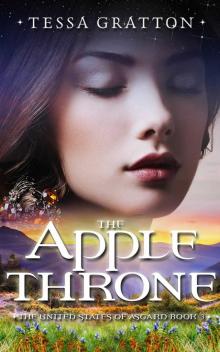 The Apple Throne
The Apple Throne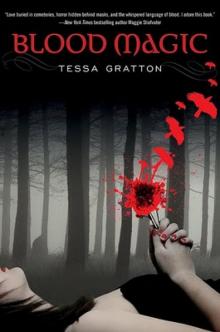 Blood Magic
Blood Magic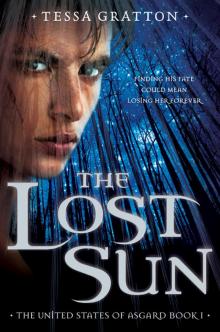 The Lost Sun
The Lost Sun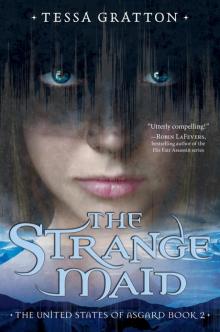 The Strange Maid
The Strange Maid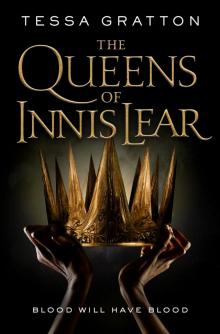 The Queens of Innis Lear
The Queens of Innis Lear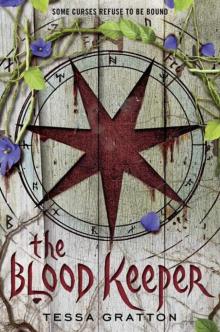 The Blood Keeper
The Blood Keeper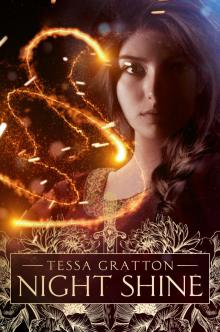 Night Shine
Night Shine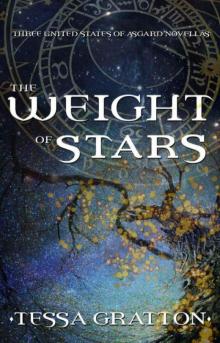 The Weight of Stars
The Weight of Stars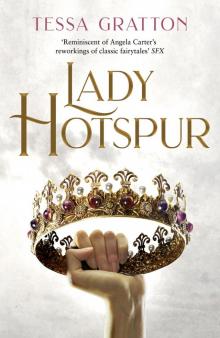 Lady Hotspur
Lady Hotspur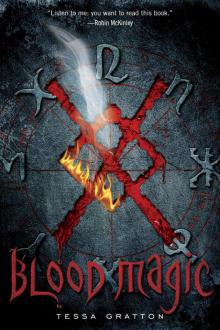 Blood Magic (The Blood Journals)
Blood Magic (The Blood Journals)